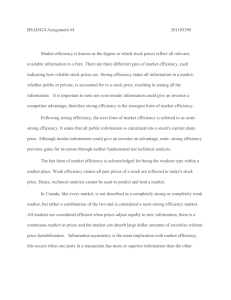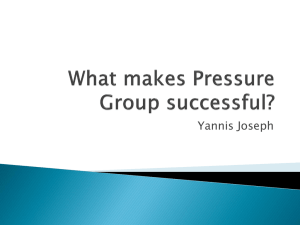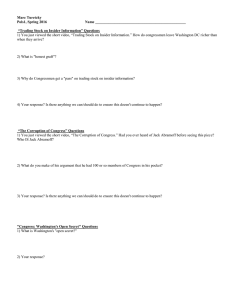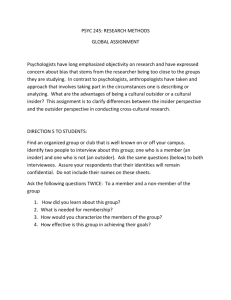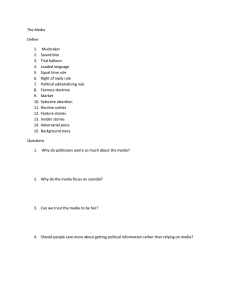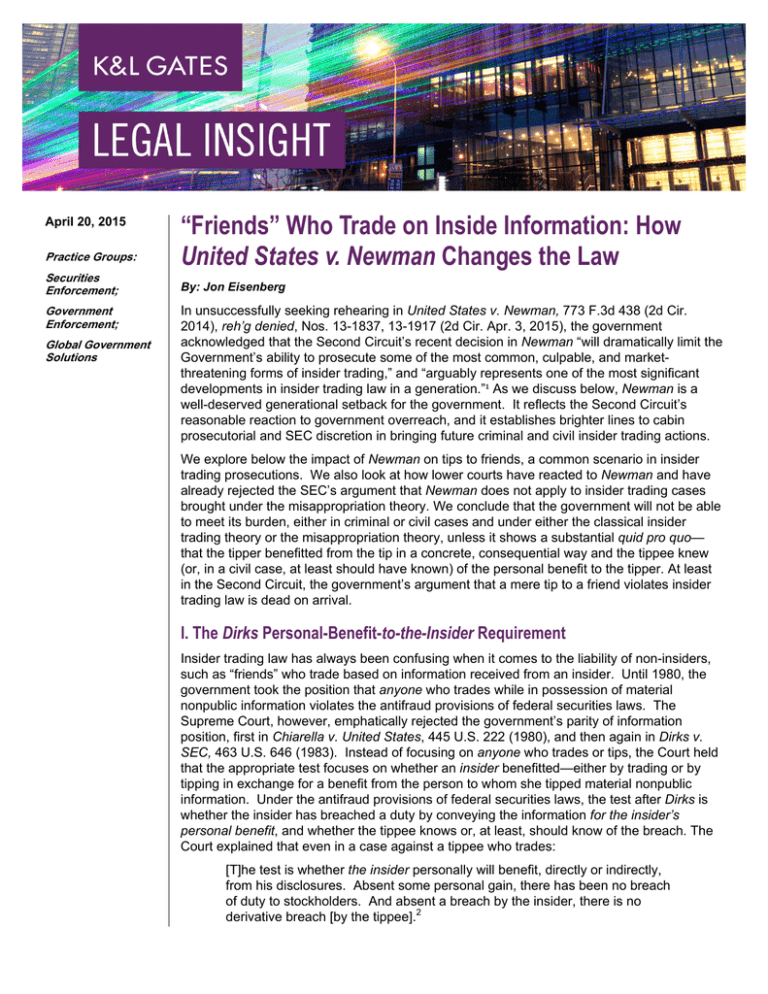
April 20, 2015
Practice Groups:
Securities
Enforcement;
Government
Enforcement;
Global Government
Solutions
“Friends” Who Trade on Inside Information: How
United States v. Newman Changes the Law
By: Jon Eisenberg
In unsuccessfully seeking rehearing in United States v. Newman, 773 F.3d 438 (2d Cir.
2014), reh’g denied, Nos. 13-1837, 13-1917 (2d Cir. Apr. 3, 2015), the government
acknowledged that the Second Circuit’s recent decision in Newman “will dramatically limit the
Government’s ability to prosecute some of the most common, culpable, and marketthreatening forms of insider trading,” and “arguably represents one of the most significant
developments in insider trading law in a generation.”1 As we discuss below, Newman is a
well-deserved generational setback for the government. It reflects the Second Circuit’s
reasonable reaction to government overreach, and it establishes brighter lines to cabin
prosecutorial and SEC discretion in bringing future criminal and civil insider trading actions.
We explore below the impact of Newman on tips to friends, a common scenario in insider
trading prosecutions. We also look at how lower courts have reacted to Newman and have
already rejected the SEC’s argument that Newman does not apply to insider trading cases
brought under the misappropriation theory. We conclude that the government will not be able
to meet its burden, either in criminal or civil cases and under either the classical insider
trading theory or the misappropriation theory, unless it shows a substantial quid pro quo—
that the tipper benefitted from the tip in a concrete, consequential way and the tippee knew
(or, in a civil case, at least should have known) of the personal benefit to the tipper. At least
in the Second Circuit, the government’s argument that a mere tip to a friend violates insider
trading law is dead on arrival.
I. The Dirks Personal-Benefit-to-the-Insider Requirement
Insider trading law has always been confusing when it comes to the liability of non-insiders,
such as “friends” who trade based on information received from an insider. Until 1980, the
government took the position that anyone who trades while in possession of material
nonpublic information violates the antifraud provisions of federal securities laws. The
Supreme Court, however, emphatically rejected the government’s parity of information
position, first in Chiarella v. United States, 445 U.S. 222 (1980), and then again in Dirks v.
SEC, 463 U.S. 646 (1983). Instead of focusing on anyone who trades or tips, the Court held
that the appropriate test focuses on whether an insider benefitted—either by trading or by
tipping in exchange for a benefit from the person to whom she tipped material nonpublic
information. Under the antifraud provisions of federal securities laws, the test after Dirks is
whether the insider has breached a duty by conveying the information for the insider’s
personal benefit, and whether the tippee knows or, at least, should know of the breach. The
Court explained that even in a case against a tippee who trades:
[T]he test is whether the insider personally will benefit, directly or indirectly,
from his disclosures. Absent some personal gain, there has been no breach
of duty to stockholders. And absent a breach by the insider, there is no
derivative breach [by the tippee].2
“Friends” Who Trade on Inside Information: How United States v. Newman
Changes the Law
Indeed, the requirement that the government prove a personal benefit to the insider even in a
tippee case is the central holding of Dirks. Dirks states, “It is important in this type of case to
focus on policing insiders and what they do … rather than on policing information per se and
its possession” (emphasis added).3 The focus, the Court holds, is on “whether the insider
receives a direct or indirect personal benefit from the disclosure, such as a pecuniary gain or
a reputational benefit that will translate into future earnings.”4 The issue for courts is
“[d]etermining whether an insider personally benefits from a particular disclosure….”5 The
three dissenting justices in Dirks accurately characterized the Court’s holding as excusing “a
knowing and intentional violation of an insider’s duty to shareholders if the insider does not
act from a motive of personal gain.”6 The SEC, in its brief unsuccessfully seeking rehearing
in Newman candidly acknowledged that under Dirks, “Absent a showing that the insider
received a ‘direct or indirect personal benefit’ from disclosing inside information to the initial
tippee, neither the insider nor any tippee can be held liable under Section 10(b) and Rule
10b-5 because there is ‘no breach’ of trust or confidence by the insider, and ‘no derivative
breach’ by any tippee.”7
II. Does Friendship Nullify the Personal Benefit Requirement?
At first glance, the personal-benefit-to-the-insider test would preclude tippee liability absent
some type of payoff to the insider. After all, unless the insider is receiving a kickback or
participating in the tippee’s profits, an insider usually stands to lose rather than gain by
sharing confidential corporate information with an outsider. An insider who wants to help a
friend might share confidential information for the benefit of the friend, but the Dirks personal
benefit test focuses on whether there is a benefit to the insider, not whether there is a benefit
to the friend.
Dirks, however, did not sound the death knell for tippee liability. Despite its focus on policing
insiders rather than information, it acknowledged, “The need for a ban on some tippee
trading is clear.”8 It then threw the SEC and federal prosecutors a bone by arguably allowing
an elastic definition of the “personal benefit” test. In language that has been widely relied on
by the government in its prosecution of tippees in insider-trading cases, the Court stated that
facts that might justify an inference that insiders acted for their personal benefit would
include the following:
There may be a relationship between the insider and the recipient that
suggests a quid pro quo from the latter, or an intention to benefit the
particular recipient. The elements of fiduciary duty and exploitation of
nonpublic information also exist when an insider makes a gift of confidential
information to a trading relative or friend. The tip and trade resemble trading
by the insider himself followed by a gift of the profits to the recipient.9
Three difficult sets of questions arise after Dirks:
First, does a gift of confidential information to a “friend” satisfy the personal-benefit-to-theinsider test? If so, doesn’t that render the personal benefit test a nullity when it comes to
friends? How does one reconcile the Court’s overwhelming focus on the insider’s personal
benefit with its statements that “an intention to benefit the particular recipient” and making a
“gift” of confidential information to a “friend” may suffice?
Second, who counts as a “friend”? If, under Dirks, a tip to a friend must “resemble trading by
the insider himself followed by a gift of the profits to the recipient,” must the friend be the type
2
“Friends” Who Trade on Inside Information: How United States v. Newman
Changes the Law
of person to whom the insider would normally bestow a financial gift (a group that resembles
the proverbial “null set” for many insiders) or does any type of acquaintance suffice?
Third, what must the friend know to be liable for insider trading? Dirks is explicit in saying
that for tippee liability to arise the tippee—the friend in our case—should have known the
information was tipped in breach of the insider’s duty. Since Dirks also states that the only
breach of duty that counts is a disclosure for the insider’s personal benefit, must the friend
also know that the insider tipped for the insider’s personal benefit?
III. Newman’s Rejection of the Government’s Position that Friendship Nullifies
the Personal Benefit to the Insider Requirement
Ever since the Supreme Court rejected the government’s parity-of-information theory, the
government’s position, in both criminal and civil cases, had been that 1) a tip to a friend is
enough to satisfy the Dirks personal benefit test, 2) virtually anyone who is an acquaintance
can be labeled a friend, and 3) liability arises if the friend knew (or, in civil cases, should
have known) of the insider’s breach, even if the friend does not know the insider tipped for
the insider’s personal benefit. By defining friendship broadly and using it to nullify the
personal-benefit test, the government, in both criminal and civil cases, has advanced a
position fairly close to the “parity of information” standard that the Supreme Court twice
rejected in Chiarella and Dirks.
As discussed below, in Newman, the Second Circuit rejected the government’s position on
each of these three core issues, even though the first two issues were barely raised by any
of the defendants.10 The Newman decision and the government’s briefs unsuccessfully
seeking rehearing demonstrate that the Newman gloss on Dirks will make it far more difficult
for the government to prosecute “friends” who trade on material nonpublic information. By
bringing a case against the remotest of tippees, the government provoked the Second Circuit
into adopting a standard that, even in the case of tips to friends, now requires the
government to demonstrate a quid pro quo for the tip. The focus now, which is the focus the
Supreme Court intended in Dirks, is on policing insiders rather than policing information.
Newman involved two defendants who traded in Dell and NVIDIA and, as a result of those
trades, made $4 million and $68 million for their funds. According to the government, in the
case involving trading in Dell stock, a member of Dell’s investor relations department shared
material nonpublic information with a “friend” he had once worked with at Dell and who had
gone on to work on Wall Street. The government showed that the insider sought career
advice from his “friend” and that his friend edited the insider’s resume and sent it to a Wall
Street recruiter. With regard to the trading in NVIDIA stock, an insider in NVIDIA’s finance
unit shared material nonpublic information with a “friend” that the insider knew from church.
They were “family friends” and occasionally socialized together. Neither the insiders nor the
first-level tippees—the so-called friends— traded on the information, but the tippees passed
the information on to others, and those others passed the information on to yet others, and
eventually people at the end of the chain—hedge fund managers—learned the information
and used it to trade in Dell and NVIDIA. Despite the need to show that the insiders acted for
personal benefit, the government never charged the insiders themselves with any violations
of the securities laws.
The government alleged that because the insiders shared material nonpublic information
with friends, that friendship alone was enough to satisfy the Dirks personal-benefit test. The
3
“Friends” Who Trade on Inside Information: How United States v. Newman
Changes the Law
Second Circuit emphatically rejected this position. It held, “To the extent Dirks suggests that
a personal benefit may be inferred from a personal relationship between the tipper and the
tippee, where the tippee’s trades ‘resemble trading by the insider himself followed by a gift of
the profits to the recipient …,’ we hold that such an inference is impermissible in the absence
of proof of a meaningfully close personal relationship….”11 It stated that if the personal
benefit test could be satisfied “by the mere fact of friendship, particularly of a casual or social
nature …,the personal benefit requirement would be a nullity.”12 The Second Circuit didn’t
say, as an anonymous motivational quote-giver once said, a friend must be “someone who
knows the song to your heart and can sign it back to you when you have forgotten the
words.” But the “meaningfully close personal relationship” is a high standard that the
government will not be able to meet in many cases.
More importantly, the Second Circuit held that even proof of a tip to someone with whom the
insider had a “meaningfully close personal relationship” would not, itself, be enough. There
had to be proof of a meaningfully close personal relationship “that generates an exchange
that is objective, consequential, and represents at least a potential gain of a pecuniary or
similarly valuable nature.”13 The tipper’s gain from the quid pro quo does not have to be
“immediately pecuniary,” but “the personal benefit received in exchange for confidential
information must be of some consequence”—for example, giving the insider access to an
investment club where stock tips were routinely discussed or the recipient of the information
referred business to the tipper.14 Providing career advice was not a sufficient personal
benefit to the insider in Newman because it “was little more than the encouragement one
would generally expect of a fellow alumnus or casual acquaintance” and had started long
before the insider provided any insider information.15 Likewise, the “ephemeral” value of the
friendship itself is not enough. One wonders, after Newman, whether there is any practical
difference between a tip to a friend and a tip to a stranger in terms of potential liability, since
the requirement of a potential gain of a pecuniary or similarly valuable nature would now
appear to apply to any tippee, friend or not.
In what was the core issue in Newman, the Second Circuit also rejected the government’s
position that the tippee need only know of the insider’s breach, but not that the insider acted
for a personal benefit. The Court stated that Dirks stands for three propositions:
First, the tippee’s liability derives only from the tipper’s breach of a fiduciary
duty, not from trading on material, non-public information…. Second, the
corporate insider has committed no breach of fiduciary duty unless he
receives a personal benefit in exchange for the disclosure. Third, even in the
presence of a tipper’s breach, a tippee is liable only if he knows or should
have known of the breach.16
Because the exchange of confidential information “for personal benefit” is the breach that
triggers liability, “without establishing that the tippee knows of the personal benefit received
by the insider in exchange for the disclosure, the Government cannot meet its burden of
showing that the tippee knew of a breach.”17 The court distinguished prior tippee cases,
stating that, in those cases, the tippees directly participated in the tipper’s breach and knew
of the tipper’s disclosure for personal benefit, or the tippees were explicitly told of the tipper’s
gain by an intermediary tippee. Said the Court, “Dirks clearly defines a breach of fiduciary
duty as a breach of the duty of confidentiality in exchange for a personal benefit….
Accordingly, we conclude that a tippee’s knowledge of the insider breach necessarily
4
“Friends” Who Trade on Inside Information: How United States v. Newman
Changes the Law
requires knowledge that the insider disclosed confidential information in exchange for
personal benefit.”18
Thus, after Newman, friendship has no significance unless, at a minimum, it involves a
“meaningfully close personal relationship,” and, even then, there must be a quid pro quo that
will eventually translate into a concrete pecuniary benefit for the insider, and the tippee who
trades must know that the insider tipped for the insider’s personal benefit. The standards will
be difficult or impossible for the government to prove, not only in many cases involving
remote tippees, but in all other cases where there is nothing equivalent to a quid pro quo for
the tip.
IV. The Government’s Concessions in Its Unsuccessful Petition for Rehearing
As noted above, the government’s unsuccessful petition for rehearing stated that the
decision in Newman “will dramatically limit the Government’s ability to prosecute some of the
most common, culpable, and market-threatening forms of insider trading,”19 and that the
opinion’s “’exchange’-based pecuniary limitation on what constitutes a personal benefit …
arguably represents one of the most significant developments in insider trading law in a
generation.”20 It stated that the Second Circuit had eliminated Dirks’s recognition “that an
improper but uncompensated gift of information by an insider suffices,”21 and had created “a
set of novel confounding criteria for the type of ‘exchange’ that will now be required before an
insider’s deliberate transmission of valuable inside information to a friend or relative could be
punishable under the laws against insider trading.”22 It recited the Second Circuit test going
forward as requiring a “(1) meaningfully close personal relationship” generating “(2) an
exchange that is (3) objective, (4) consequential, and (5) represents at least a potential gain
of a pecuniary or similarly valuable nature.”23 That is an accurate characterization of the
Second Circuit test in Newman; the government will have to live with it going forward.
The SEC, in its amicus brief in support of the government’s petition for rehearing, stated that
rehearing should be granted because the panel’s decision “states that evidence of friendship
between an insider who tips and his tippee is insufficient to support an inference that the
insider derived a personal benefit from the tipping—a requirement for liability.”24 It
complained that contrary to the Second Circuit’s decision, “The Commission has long held
the position that Dirks does not require the insider to obtain an economic benefit from the tip,
and that it is sufficient if the insider makes a gift of confidential information to a trading
relative or friend.”25 It stated, “The SEC has litigated numerous insider trading claims in this
circuit where the only personal benefit to the tipper apparent from the decisions was
providing inside information to a friend,”26 that an even larger number of cases had been
settled on that basis, and that the panel’s “narrowed benefit standard” could limit the SEC’s
ability to pursue similar violators in this circuit in future cases.27 The SEC is right. The
Second Circuit’s standard does make it much harder for the SEC ever again to allege tippee
liability, even in the case of “friends,” without alleging a quid pro quo. At least within the
Second Circuit—long recognized as the “Mother Court” in the area of securities law28—the
government will now have a much heavier burden than it previously thought in insider trading
cases.
5
“Friends” Who Trade on Inside Information: How United States v. Newman
Changes the Law
V. Recent Case Law Applying Newman
A. Rejection of the Argument that Newman Does Not Apply to Misappropriation
Cases
In SEC v. Payton, No. 14 Civ 4644 (S.D.N.Y. Apr. 6, 2015), issued three days after the
Second Circuit denied rehearing in Newman, the SEC argued that Newman does not apply
to the so-called “misappropriation” theory, which is the basis for many insider trading
prosecutions. In a classical insider trading case, information is tipped by an insider in breach
of the insider’s duty. In a misappropriation case, an outsider (such as a lawyer or investment
banker working on a transaction) misappropriates material nonpublic information from his
employer or other source of information in breach of a duty owed to the source of the
information, and then either trades on it or, in return for a benefit, provides it for trading
purposes to a tippee in breach of a duty to the source. United States v. O’Hagan, 521 U.S.
642 (1997).
Judge Rakoff rejected the SEC’s argument in Payton that Newman does not apply to
misappropriation cases. The SEC’s argument failed, Judge Rakoff said, because Newman
anticipated that argument and said that “[t]he elements of tipping liability are the same
regardless of whether the tipper’s duty arises under the ‘classical’ or the ‘misappropriation’
theory.”29 Thus, just as Newman requires proof of a benefit to the insider in a classical
insider trading case, Newman requires proof of a benefit to the tipper in the typical
misappropriation case. Said Judge Rakoff, “While a purist might regard these statements as
dicta—since they were not technically necessary to the resolution of the case in Newman,
which involved a classical theory of insider trading—nonetheless, these statements seem so
clearly intended to give guidance to the lower courts of this Circuit that this Court takes them
as binding.”
The court, however, then went on to find that in the unusual circumstances of that case there
was a close personal relationship between the tipper and tippee, that the relationship was a
“quid pro quo” relationship in which the tipper and tippee “shared a close mutually-dependent
financial relationship,” involving a “history of personal favors,” in which the tippee initially
“pa[id] their shared expenses,” “negotiated reductions in their utilities and rent payments,”
and assisted the tipper in defending a criminal legal matter. The court held that in those
circumstances, “the Amended Complaint more than sufficiently alleges that [the tipper] and
[the tippee] had a meaningfully close personal relationship and that [the tipper] disclosed the
inside information for a personal benefit sufficient to satisfy the Newman standard.” The
court also found that, with respect to the downstream defendants who traded, the allegations
in the Amended Complaint “raise the reasonable inference that the defendants knew that
[the tipper’s] relationship with the [initial tippee] involved reciprocal benefits” and “knew the
basic circumstances surrounding the tip” or, despite having substantial knowledge,
“consciously avoided” learning the details about the source of the inside information and the
nature of the initial disclosure. The Amended Complaint also alleged that the tippees took
multiple steps to conceal their trading.
While the court in Payton found a close personal relationship, a quid pro quo, and knowledge
or conscience avoidance of knowledge by the defendants—i.e., all of the elements required
by Newman— it also stated that the fact that a person committing a criminal offense must act
“knowingly” while a person committing a civil violation need only have acted “recklessly” is a
6
“Friends” Who Trade on Inside Information: How United States v. Newman
Changes the Law
distinction that arguably makes a difference in some cases. That difference, however, goes
to the tipee’s degree of culpability. It does not change the requirement that the tipper tipped
for the tipper’s personal benefit. Moreover, in securities cases, even recklessness is a
difficult standard to meet. The Second Circuit has long held that even in a civil case,
recklessness is not merely conduct that is highly unreasonable and an extreme departure
from the standards of ordinary care; it is conduct in which the relevant facts were “either
known to the defendant or so obvious that the defendant must have been aware of it.” Rolf
v. Blyth, Eastman Dillon & Co., Inc., 570 F.2d 38, 47 (2d Cir. 1978) (quoting Sanders v. John
Nuveen & Co., 554 F.2d 790, 793 (7th Cir. 1977).
In In the Matter of Gregory T. Bolan, Jr. and Joseph C. Ruggieri, Administrative Proceedings
Rulings Release No. 2309 (Feb. 12, 2015), an SEC administrative law judge also rejected
the SEC’s argument that Newman does not apply to misappropriation cases. He stated that
the SEC’s argument was refuted by both the language in Newman and the Second Circuit’s
statement in SEC v. Obus, 693 F.3d 276, 284 (2d Cir. 2012) that the Dirks analysis governs
both classical insider trading cases and insider trading cases based on the misappropriation
theory. The administrative law judge found, however, that the allegations that the tipper
tipped a “good friend” with whom he had a “close, meaningful personal relationship,” in order
to obtain an accelerated promotion and a $50,000 annual raise was enough to avoid a
summary dismissal of the complaint. Administrative Proceedings Rulings Release No. 2350
(Feb. 25, 2015).
B. The “Plain Error” Requirements for Cases Tried Under Erroneous PreNewman Jury Instructions
United States v. Riley, No. 13-CR-339-1 (S.D.N.Y. Mar. 3, 2015), arose in an unusual
procedural posture. In that case, a jury had already convicted an insider based on preNewman instructions. At trial, the government established that the chief information officer of
a public company tipped material nonpublic information to an analyst who worked for a
hedge fund, and that the analyst, in turn, tipped people who traded. A jury convicted the
insider for tipping material nonpublic information after the court instructed the jury that it
could convict if the insider provided the information for the purpose of “maintaining or
furthering a friendship”—a standard that Newman rejects. Indeed, Judge Rakoff, in footnote
2 of his decision in Payton, highlighted that the difference between Dirks and Newman is that
“the Dirks decision seems to distinguish a quid pro quo relationship from instances where an
insider makes a ‘gift’ of confidential information to a relative or friend; whereas, the Newman
decision suggests that the latter type of relationship (i.e., mere friendship) can lead to an
inference of personal benefit only where there is evidence that it is generally akin to quid pro
quo.”
The district court in Riley refused to grant a new trial in part because, according to the court,
the instruction may have been erroneous but it was not “plain error.” It stated—in language
that is inconsistent with Newman—that a tip given to maintain or further a friendship may be
“circumstantial evidence that the friendship is a quid pro quo relationship.” “While a court
could rule that merely maintaining or furthering a friendship is not sufficient personal benefit,”
the court said, “it is not ‘plain’ that the Second Circuit has done so already.” But, Newman
rejects exactly that type of argument when it holds there must be a close personal
relationship “that generates an exchange that is objective, consequential, and represents at
least a potential gain of a pecuniary or similarly valuable nature.” Something as ephemeral
7
“Friends” Who Trade on Inside Information: How United States v. Newman
Changes the Law
as maintaining a friendship does not begin to meet the “objective,” “consequential,” gain of a
“pecuniary or similarly valuable nature” required by Newman. That wasn’t clear at the time
the district court instructed the jury because Newman had not been issued; it is crystal clear
now that Newman has been decided.
The district court went on to find that the insider received three other concrete benefits that
were “objective, consequential, and represent[ed] at least a potential gain of a pecuniary or
similarly valuable nature”— receiving help for his business, investment advice that resulted in
profitable trades, and assistance in trying to secure a new job, although these arguably
amounted to very little. It remains to be seen whether the Second Circuit will eventually
order a new trial in light of Newman or will agree with the district court that the defendant
failed one or more of the plain-error standards. Reading the district court’s opinion, one gets
the impression that having already presided over a 10-day trial and several days of
deliberation before Newman was issued, the district court may have been inclined to give
Newman a more narrow reading than the decision warrants.
C. Liability of Tippers for the Tippees’ Trading Profits
Finally, in SEC v. Sabrdaran, Case No. 14-cv-04825 (N.D. Cal. Mar. 2, 2015), the
government alleged that an insider of a pharmaceutical company shared material nonpublic
information with a close friend who helped care for the insider’s ailing parents. According to
the complaint, the close friend traded and later paid the insider $26,000. The close friend
also tipped “secondary tippees” who traded as well, but were not charged with wrongdoing—
presumably because they did not know that the material nonpublic information had been
tipped for the insider’s personal gain. The court held that, under well-settled law in the Ninth
Circuit, a tipper can be required to disgorge his tippees’ profits, even if the tippees
themselves have not been found liable, and that Newman is not inconsistent with that.
Instead, it observed, “There is nothing in Newman that suggests that the Second Circuit
intended to undercut the long line of authority holding that an individual liable for insider
trading may be on the hook for profits gained by tippees, even where the tippees are not
themselves liable for insider trading because they did not have the requisite knowledge.”
Finding Newman irrelevant to the issue, the court declined to dismiss the complaint or that
part of the complaint related to the tipper’s potential liability for the tippees’ profits. Thus,
Sabrdaran takes the position that an insider may be liable for the tippee’s profits even if the
tippees, because they did not know the original source of the information, did nothing
unlawful. A contrary argument could also be made—that in circumstances in which the
tippee trading was lawful, there are no illicit profits for the insider to disgorge. But that is not
the position that Sabrdaran took, and the decision merely confirms that an insider who
allegedly accepts $26,000 from a close friend in exchange for material nonpublic information
runs the risk that courts will treat the insider harshly. It says nothing at all, however, about
circumstances in which there is no quid pro quo.
Conclusion
Newman is a sea change in the law when it comes to insiders who tip friends without a quid
pro quo. A quid pro quo has now become the sine qua non in insider trading cases, along
with a requirement that defendants, including friends who trade, know that the information
was tipped for the tipper’s benefit or, in a civil case, at least should have known that fact.
The quid pro quo cannot be something ephemeral; it must be “an exchange that is objective,
8
“Friends” Who Trade on Inside Information: How United States v. Newman
Changes the Law
consequential, and represents at least a potential gain of a pecuniary or similarly valuable
nature.” This new standard is intended to impose a requirement that is concrete and
meaningful. It will be a challenging, or impossible, hurdle for the government in many
cases, but is consistent with the Supreme Court’s focus on policing insiders rather than
information and with the Second Circuit’s focus on providing brighter line standards to limit
prosecutorial discretion. The government pushed too far in its insider-trading prosecutions,
and the Second Circuit has now put on the brakes.
Authors:
Jon Eisenberg
jon.eisenberg@klgates.com
+1.202.778.9348
Anchorage Austin Beijing Berlin Boston Brisbane Brussels Charleston Charlotte Chicago Dallas Doha Dubai Fort Worth Frankfurt
Harrisburg Hong Kong Houston London Los Angeles Melbourne Miami Milan Moscow Newark New York Orange County Palo Alto Paris
Perth Pittsburgh Portland Raleigh Research Triangle Park San Francisco São Paulo Seattle Seoul Shanghai Singapore Spokane
Sydney Taipei Tokyo Warsaw Washington, D.C. Wilmington
K&L Gates comprises more than 2,000 lawyers globally who practice in fully integrated offices located on five
continents. The firm represents leading multinational corporations, growth and middle-market companies, capital
markets participants and entrepreneurs in every major industry group as well as public sector entities, educational
institutions, philanthropic organizations and individuals. For more information about K&L Gates or its locations,
practices and registrations, visit www.klgates.com.
This publication is for informational purposes and does not contain or convey legal advice. The information herein should not be used or relied upon in
regard to any particular facts or circumstances without first consulting a lawyer.
© 2015 K&L Gates LLP. All Rights Reserved.
1
Petition of the United States of America for Rehearing and Rehearing En Banc in United States
v. Newman at 3, 22-23 (Jan. 23, 2015) (hereinafter, “United States Petition for Rehearing”).
2
463 U.S. at 662.
3
Id. at 663 (citing In re Investors Management Co., 44 S.E.C. 633, 648 (1971) (concurring
opinion) (emphasis added).
4
Id. at 663 (emphasis added).
5
Id. at 664 (emphasis added).
6
Id. at 668 (emphasis added).
7
Brief for the Securities and Exchange Commission as Amicus Curiae Supporting the Petition of
the United States for Rehearing or Rehearing En Banc in United States v. Newman (hereinafter
“SEC Amicus Brief in Support of Petition for Rehearing”) (Jan. 29, 2015) at 4 (emphasis added).
8
463 U.S. at 659.
9
Id. at 664 (emphasis added).
10
This is why the United States complained in its petition for rehearing that the court in Newman
had “seiz[ed] on an issue raised briefly by only one defendant [to] … redefine[] a critical element
of insider trading liability….” United States Petition for Rehearing at 2.
11
773 F.3d at 452.
9
“Friends” Who Trade on Inside Information: How United States v. Newman
Changes the Law
12
Id.
Id.
14
Id.
15
Id. at 453.
16
Id. at 447.
17
Id. at 448.
18
Id. at 449.
19
United States Petition for Rehearing at 3.
20
Id. at 22–23.
21
Id. at 14.
22
Id.
23
Id.
24
SEC Amicus Brief in Support of Petition for Rehearing at 22–23.
25
Id. at 5.
26
Id. at 11.
27
Id. at 12.
28
Blue Chip Stamps v. Manor Drug Stores, 421 U.S. 723, 762 (1975) (dissenting op).
29
Newman, 773 F.3d at 446.
13
10

